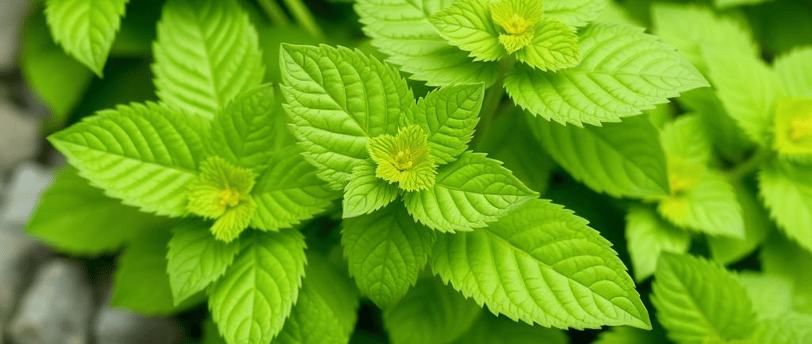Lemon Balm for Heart Health: The Calming Herb That Supports Cardiovascular Function
❤️HEART HEALTH


Lemon balm, also known as Melissa officinalis, is a member of the mint family renowned for its delightful lemon scent and calming properties. Traditionally used to reduce stress and promote relaxation, this herb is now gaining attention for its potential benefits in supporting cardiovascular health. This article will delve into the scientific basis behind lemon balm’s cardiovascular benefits, discuss the forms available, provide recipes and dosage recommendations, and outline precautions and side effects associated with its use.
The Scientific Basis of Lemon Balm
Lemon balm has long been used in herbal medicine, but modern research has begun to unveil its potential benefits for heart health. One of the primary components of lemon balm is rosmarinic acid, which has demonstrated anti-inflammatory and antioxidant properties. These properties can help reduce oxidative stress and inflammation, two factors known to contribute to heart disease.
A study published in the Journal of Medicinal Food highlighted how lemon balm may positively influence blood lipid profiles. Elevated levels of low-density lipoprotein (LDL) cholesterol and triglycerides are significant risk factors for cardiovascular disease. The study indicated that lemon balm extract could help lower LDL cholesterol and improve overall cholesterol levels, thus promoting heart health.
Moreover, lemon balm is known for its calming effects due to high concentrations of flavonoids and polyphenols. By reducing stress and anxiety, lemon balm may indirectly support heart health as chronic stress is a recognized risk factor for cardiovascular events. Stress causes the body to release cortisol and other hormones that can lead to increased heart rate and blood pressure, which, in turn, may strain the cardiovascular system.
Forms Available
Lemon balm is available in various forms, allowing individuals to choose the most suitable method for consumption based on their preferences:
Fresh Leaves: Fresh lemon balm leaves can be used in salads, infused in teas, or as a garnish for various dishes.
Dried Herb: Dried lemon balm can be steeped in hot water to make herbal tea, often combined with other calming herbs like chamomile or valerian root.
Essential Oil: Lemon balm essential oil can be used in aromatherapy, promoting relaxation and reducing stress. It’s essential to dilute it with a carrier oil before topical application.
Tinctures and Extracts: Alcohol-based tinctures or glycerin extracts are concentrated forms of lemon balm, allowing for convenient dosing.
Capsules and Tablets: For those who prefer not to taste herbs, lemon balm supplements in capsule or tablet form are readily available.
Recipes Featuring Lemon Balm
Incorporating lemon balm into your diet can be both enjoyable and beneficial for your heart health. Here are a few simple recipes to get you started:
Lemon Balm Tea
Ingredients:
1 tablespoon fresh lemon balm leaves (or 1 teaspoon dried)
2 cups boiling water
Honey or lemon for flavor (optional)
Instructions:
Place the lemon balm leaves in a teapot or heatproof container.
Pour boiling water over the leaves and steep for 5-10 minutes, depending on your desired strength.
Strain into cups, add honey or lemon if desired, and enjoy.
Lemon Balm Citrus Salad
Ingredients:
2 cups mixed greens
1 cup sliced strawberries
1 orange, segmented
1 tablespoon chopped fresh lemon balm
2 tablespoons olive oil
1 tablespoon balsamic vinegar
Salt and pepper to taste
Instructions:
In a large bowl, combine greens, strawberries, orange segments, and lemon balm.
In a small bowl, whisk together olive oil, balsamic vinegar, salt, and pepper.
Drizzle the dressing over the salad, toss lightly, and serve.
Lemon Balm Infused Water
Ingredients:
1 quart water
1/4 cup fresh lemon balm leaves
Slices of cucumber or lemon (optional)
Instructions:
In a large pitcher, combine the water and lemon balm leaves (add cucumber or lemon slices for flavor).
Let it steep in the refrigerator for 2-4 hours.
Strain the leaves and serve chilled for a refreshing drink.
Dosage Recommendations
When it comes to dosage, individual needs may vary depending on factors such as age, health status, and the form of lemon balm used. Generally, the following dosages are recommended:
Tea: 1-2 cups per day of brewed lemon balm tea.
Tinctures: 30-60 drops, 1-3 times a day.
Capsules/Tablets: 300-600 mg up to three times a day, depending on the concentration.
However, it is advisable to consult with a healthcare professional before starting any new herbal regimen, particularly if you have existing health conditions or are taking medications.
Precautions and Side Effects
While lemon balm is generally well-tolerated, some individuals may experience side effects. Common adverse reactions include:
Nausea
Vomiting
Stomach upset
Dizziness
Pregnant or breastfeeding women should avoid lemon balm due to a lack of sufficient studies on its safety during these times.
Moreover, lemon balm may interact with certain medications, including sedatives, thyroid medications, and certain antidepressants. Therefore, always consult a healthcare provider before incorporating lemon balm into your health routine, especially if you are taking other medications or have underlying health issues.
Conclusion
Lemon balm is a versatile and aromatic herb with promising cardiovascular benefits. By combining its calming effects with its ability to support healthy cholesterol levels and reduce stress, this herb might just be a valuable addition to your heart health regimen. By understanding the forms available, incorporating delicious recipes, and adhering to proper dosage guidelines, you can harness the calming power of lemon balm while also promoting cardiovascular wellness.
As with any herbal remedy, it is essential to approach its use with caution and seek medical advice when necessary. Through informed and responsible usage, lemon balm may serve as a delightful ally in your journey toward better heart health.
